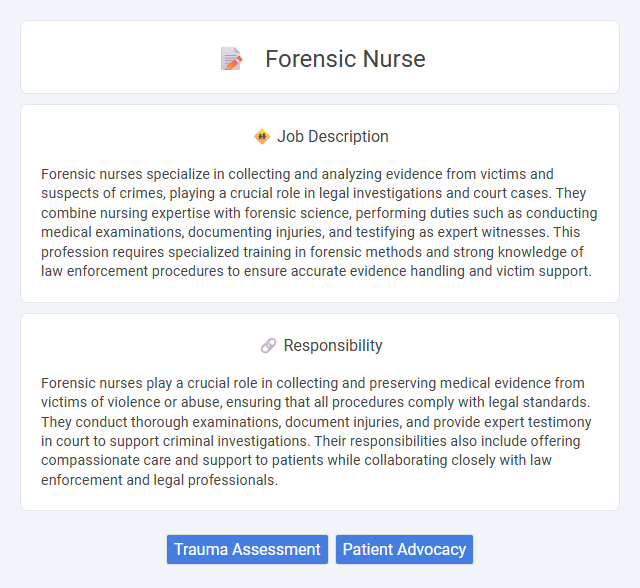
Forensic nurses specialize in collecting and analyzing evidence from victims and suspects of crimes, playing a crucial role in legal investigations and court cases. They combine nursing expertise with forensic science, performing duties such as conducting medical examinations, documenting injuries, and testifying as expert witnesses. This profession requires specialized training in forensic methods and strong knowledge of law enforcement procedures to ensure accurate evidence handling and victim support.
Individuals with a strong sense of empathy and resilience are likely suitable for a forensic nurse role, given the frequent exposure to traumatic situations and vulnerable patients. Those who can maintain professionalism under pressure and have a keen interest in both healthcare and legal processes might find this job fulfilling. However, people prone to high stress or emotional burnout may struggle to adapt effectively to the demands of forensic nursing.
Qualification
Forensic nurses must hold a valid nursing license and typically require specialized training in forensic nursing practices, including evidence collection and the care of assault victims. Certification such as the Sexual Assault Nurse Examiner (SANE) credential enhances expertise and employability in this field. Advanced knowledge in trauma care, legal procedures, and psychological support is essential for effective performance in forensic nursing roles.
Responsibility
Forensic nurses play a crucial role in collecting and preserving medical evidence from victims of violence or abuse, ensuring that all procedures comply with legal standards. They conduct thorough examinations, document injuries, and provide expert testimony in court to support criminal investigations. Their responsibilities also include offering compassionate care and support to patients while collaborating closely with law enforcement and legal professionals.
Benefit
Forensic nurses likely provide critical benefits by combining nursing skills with legal knowledge to support victims of crime and collect essential medical evidence. This role probably enhances the accuracy of medical testimony in court cases, improving the overall justice process. The specialized nature of forensic nursing may also offer professionals unique career opportunities and personal fulfillment through patient advocacy.
Challenge
Forensic nursing likely presents the challenge of managing complex cases involving trauma and violence, requiring both medical expertise and emotional resilience. The role probably demands careful collaboration with law enforcement and legal teams to ensure accurate evidence collection and testimony. Nurses in this field may face frequent exposure to distressing situations, making stress management and ethical decision-making critical.
Career Advancement
Forensic nurses gain specialized skills intersecting healthcare and criminal justice, providing strong foundations for career advancement into roles such as nurse investigators, sexual assault nurse examiners, or forensic nurse managers. Pursuing certifications like SANE (Sexual Assault Nurse Examiner) or completing advanced degrees in forensic nursing can significantly enhance promotion opportunities and salary prospects. Leadership positions and collaboration with law enforcement agencies further expand career growth and professional recognition within the forensic nursing field.
Key Terms
Trauma Assessment
Forensic nurses specializing in trauma assessment expertly evaluate injuries related to violent crimes, domestic abuse, and accidents, ensuring precise documentation for legal proceedings. These professionals apply advanced clinical skills to identify wound patterns, differentiate between accidental and intentional trauma, and collaborate with law enforcement and legal teams. Their meticulous trauma assessments contribute to both patient care and the integrity of forensic investigations.
Patient Advocacy
Forensic nurses play a critical role in patient advocacy by ensuring the rights and dignity of victims of violence are upheld throughout medical and legal processes. They provide specialized care that integrates clinical competencies with legal knowledge to collect evidence while supporting patients emotionally and physically. This dual responsibility strengthens the justice system's response to trauma while prioritizing holistic patient well-being.
 kuljobs.com
kuljobs.com